Moana is the 56th animated feature ready to set sail into theaters on November 23, 2016. It’s an incredible tale based on Polynesian mythology and culture, as a young girl voyages the Pacific Ocean to find her way.
The Cast of Moana (Auli’i Cravalho, Dwayne Johnson, Lin-Manuel Miranda, Opetaia Foa’i, Ron Clements, John Musker and Osnat Shuer) spoke to us about voicing the characters, singing, becoming a role model, making the music and presenting the Polynesian culture in the right way.
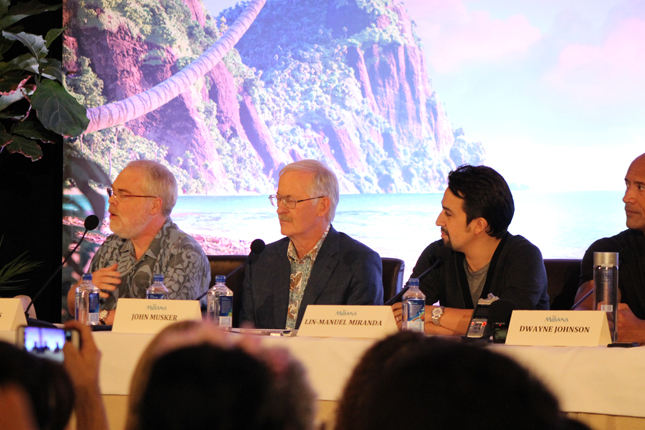
Directors Ron Clements, John Musker and music director Lin-Manuel Miranda talk about the research that went into getting the island vibe and the legend so authentic and perfect?
RON CLEMENTS: Well, this movie started five years ago, a little over five years ago, actually. Which is not that unsual for an animated film. It was John’s idea and he’d go into that a little bit in terms of how he was. He wanted to do a movie based on the world of the Pacific Islands and the mythology. That led to about five years ago. We took a trip to Fiji, Samoa and Tahiti, which really, it was the basis of the movie in terms of the connection to navigation, to people’s connection to their ancestry, respect for nature. A lot of those ideas came from that first research trip and the movie was heavily inspired by that and people that we met have stayed involved with the movie throughout its production process to try to capture as much as we could of all the wondrous things we learned and the wonderful people that we met.
JOHN MUSKER: We took a second trip to the Pacific with our musical team, so actually Lin and Opetaia, we already worked with both of them, but actually right on the front end of working with Lin.
LIN-MANUEL MIRANDA: Everyone was already in New Zealand, and you know the Pacifica Music Festival is islands and choirs from all the different islands in the Pacific. So we sort of immersed ourselves in this world and then Opetaia, Mark and I jumped into a studio and just started banging on drums and started really trying to find the pulse of this thing in a way that honored the unique musical heritage and incredible rhythms that come out of this part of the world.

Auli’i Cravalho and Dwayne Johnson on their culture and the experience they brought to the film.
AULI’I CRAVALHO: I’ve grown up in Hawaii all my life. I grew up in a small town in Kohala on the Big Island of Hawaii, where I literally grew up with pigs and chickens. I am deeply rooted to my culture. I actually go to an all-Hawaiian school where the mythology and the folklore of Maui is in our curriculum. I’ve listened to his stories as bedtime stories. I’ve grown up with the “Aloha Spirit” just around me and I’m sure Dwayne can second that.
DWAYNE JOHNSON: Yes, you know, what Auli’i just said. She mentioned a term, its called “Aloha Spirit” and it’s something that is very special. It’s very meaningful to us and our Polynesian culture. So for example, those of you who have had the opportunity to visit Hawaii or any of the Polynesian islands, it’s a very special thing. It’s an intangible, that when you get off the plane and you have your feet on the ground there, energetically it takes you to a different place. That’s “Aloha Spirit.” And you know, the opportunity that we had, just as Polynesians to be part of a story and to bring to life a story of our Polynesian culture in this capacity with our great partners at Disney. Musically with these masters, was just a really, really special opportunity for us.
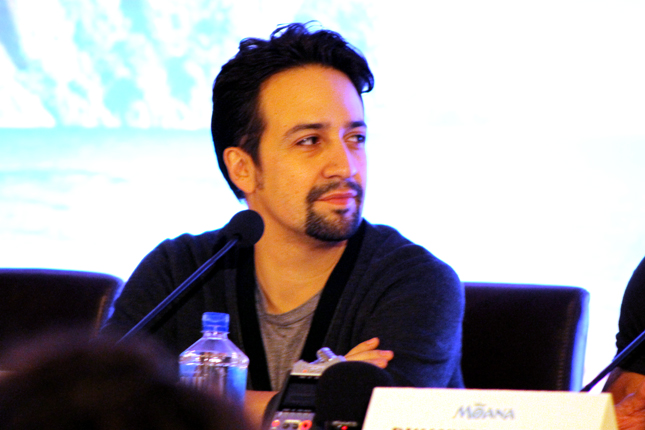
How was it working on the song, “You’re Welcome” with Dwayne.
LIN-MANUEL MIRANDA: I got a lot of questions from reporters this week being like, how did you get the Rock to sing? That’s not what happened here. When Dwayne accepted the role he said, “So what are you giving me to sing?” and he was really excited for this. As for me, I went to YouTube where the answers always lie. And you know, I’m a big fan of his wrestling days and there was a time during your “heel turn” era, where he would pull out a guitar and taunt whatever town he was in. And so I got a really good sense of his vocal range from that 10-minute super cut and then the rest of it was just writing lyrics that embody the spirit of Maui. Who is this amazing demi-god, trickster god and once I had the title, “You’re Welcome,” which only Dwayne can pull off and still have you love him and root for him. We were off to the races.
DWAYNE JOHNSON: Look, man, it was an opportunity to challenge myself. And this is, yes, as Lin was saying, he did his research. By the time I got the song, it was in my comfortable range as well and then also parts of the song which pushed me a little bit. Which I appreciate because that’s what I needed vocally as well and I had, honestly, I had such a great time. One of the best times I’ve ever had in my career was actually working on this project and certainly working on that song. Because also we all love challenges, and this was a challenge that the bar is set so incredibly high in a Disney film to sing. Like historically.
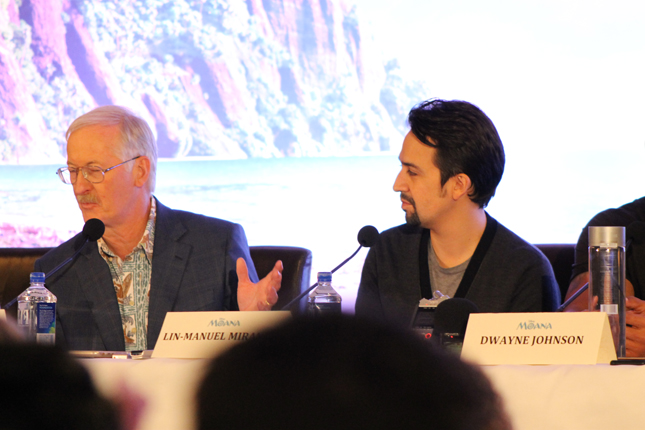
The technological advances since The Little Mermaid, Under the Sea and making the water an actual three-dimensional character within the film.
JOHN MUSKER: Well, someone asked us, “Could you have done that when you did The Little Mermaid?” and the answer was, well “no, obviously.” But actually even five years ago, I think it would have been much harder to do it. The technology just keeps developing all the time and we knew pretty early on, when we were in the islands people talked about the ocean as if it were alive and they caressed it. They had these personal relationships with the ocean, so we knew we wanted the ocean to be a character in the movie. We knew we wanted to have this lava monster in the movie. We didn’t know how to do it and we talked to a lot of very smart people, in terms, and they didn’t know how to do it either. They were saying that this is going to be really, really hard, but we think we can figure it out before the movie needs to come out, and they did. So it was actually, there was sort of groundbreaking technology in this movie. There are a lot of things in this movie, including what was done with the hair. Maui’s hair, Moana’s hair, there are things that were really breakthroughs in technology.
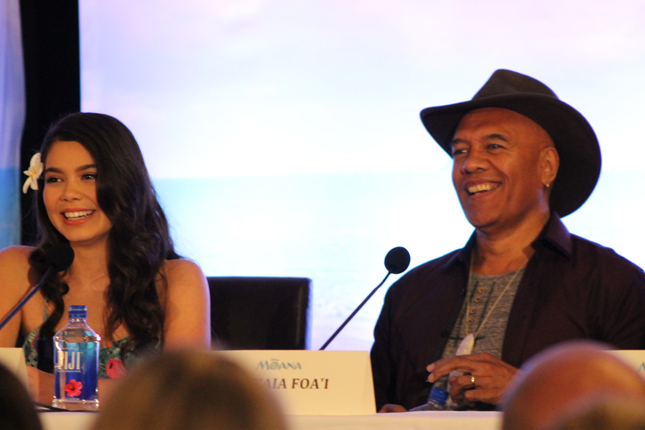
Opetaia on the past pressures, thrills and concerns as his music has moved forward in this amazing project.
OPETAIA FOA’I: Yeah, in my culture music is like breathing air and they can’t understand why somebody would make a career out of playing music. So I had to struggle throughout my whole career. My parents saying, “Get a job.” They wanted me to be a doctor, a teacher and just fighting against all those things all the way through. So, I was just saying early on, I was born in a hut. A thatched-roof hut. So to find myself here in a big city and Disney like this, it’s just beyond my dreams,. So I’m just thrilled to be part of this amazing group of people. My mouth is still open. I’ll just sit here and look at these guys. It’s just… I’m in awe.
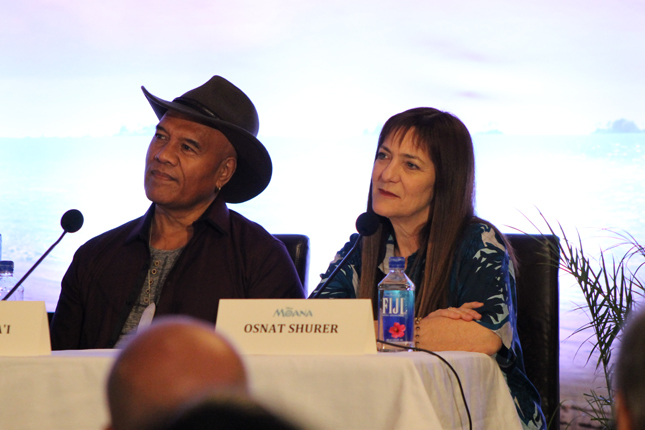
Creating musical magic and the technique to make it seem like The Little Mermaid, but also like Hamilton?
LIN-MANUEL MIRANDA: I think when I first interviewed for this job I walked into a room with Ron and John, makers of my favorite Disney film of all time and I said, “You’re the reason I even get to walk into this room.” So, I think I probably scared them a little bit because I’d quote some obscure section of Little Mermaid they had since forgotten about. So that’s part of it. I love those movies and you want to maintain the best of the Disney traditions. At the same time, we’re telling this very unique story from this very unique part of the world. And so to answer sort of the musical aspect of your question, I will admit the first time I sat down at my piano to work on something like this. I remember thinking, “Don’t think about Let it Go, don’t think about Let it Go, don’t think about Let it Go… [Starts singing to laughs] Let it go… Let it go… But you solve that problem by just really, really getting inside the heads of your characters. And my way into Moana, in particular was the way she feels. The call of the sea is the way I felt about writing music, and making movies, and singing songs. And I was 16 years old and living on 200th Street in Manhattan and thinking, the distance between where I am and where I want to be seems impossibly large. So I got myself into that mindset to write her songs.
RON CLEMENTS: And very early, when we visited the islands we heard music wherever we went, like Opetaia said, it’s part of the culture. So when we knew we wanted music to be part of the score and we really wanted the underscore of the movie to feature vocals from another language, And actually Osnat, our producer, who really zeroed in on Opetaia and Te Vaka.
OSNAT SHURER: I first came on the movie and just spent days listening to Pacific Island music and every time I thought, “Oh my God, that’s good.” It was Te Vaka. It was Opetaia and so I shamelessly called Opetaia and his lovely wife Julie and my wife and manager and we invited them to come and visit us and they became family.
OPETAIA FOA’I: I gave her a scare, because they put me on the mic and said, “Do something,” and I went, “Hmm, yum, yum, hmm…” That’s all I knew, chants and stuff.
OSNAT SHURER: It was perfect. It was exactly what we wanted.
RON CLEMENTS: And we wanted both, you know, the island character of the music and a narrative drive. So really we envisioned pairing Opetaia with someone and we met Lin in New York before Hamilton was staged about three years ago.
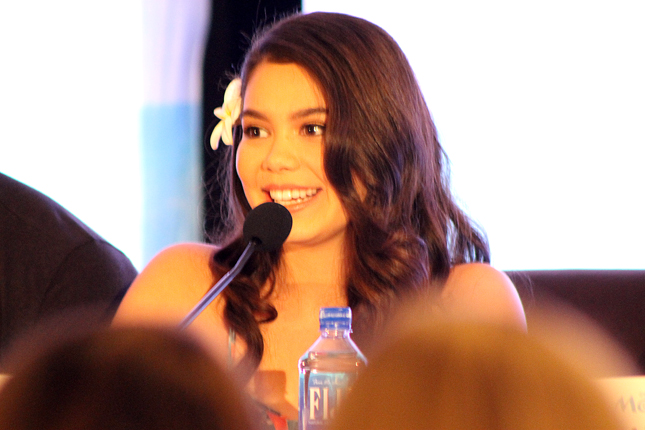
What was it like for Auli’i working with these people, having the legacy of a Disney movie and getting to be this empowering heroine.
AULI’I CRAVALHO: This is my first job. Pretty good. [To some laughing] It’s just been an incredible journey for me. I’m 15 going on 16. I’m working with the best people in the entire world, of whom are making a film inspired by my culture. The culture that I have lived every day of my life and that is something so incredibly special, for the rest of the world to see. But I mean, for me, as someone who is hoping to continue in show business, now that I’m in show biz. Which is really exciting. I was wondering, how would I continue in this and still be Polynesian. That might be an interesting concept and it was an interesting concept for me to even think up. But as I continue in this and as I potentially might leave my home, what does that make me? Does that still keep me Polynesian? Am I still grounded and rooted in the way that I want to be? I can honestly say “yes,” because being surrounded by my family and by the Hawaiian culture every day, it seems as though I would never lose it. But to have a film like this that will inspire me and to have a character that will inspire others as well, to become rooted in who they truly are. That’s something that inspires me and that I hope will inspire others as well. Which is what this incredible team put together, so thank you.
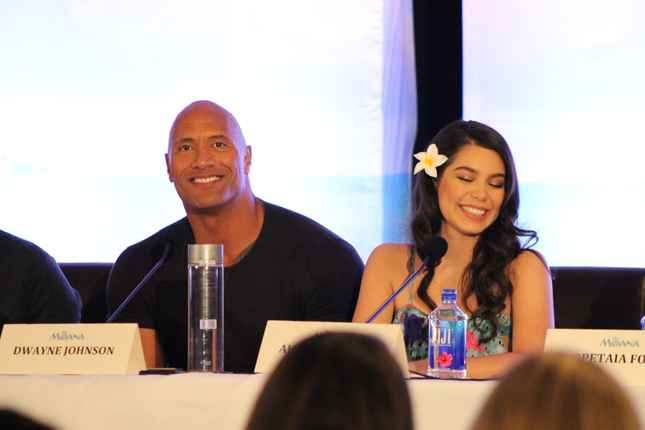
What does Dwayne, Auli’i and Opetaia hope that the Polynesian people will take from watching Moana?
OPETAIA FOA’I: Well, for me personally, my journey has been from the village to the city. Now, this movie, I said it earlier on, I can vouch for it that our ancestors are happy with this movie, culturally speaking. So there are many other cultures that will see this movie and be interested in the movie. But also there will be Polynesians who were born in the cities who will then start the journey back to the roots. That’s what I’m thrilled about. Dwayne.
DWAYNE JOHNSON: Auli’i. Ladies first. [To laughter]
OPETAIA FOA’I: Tag, you’re it.
AULI’I CRAVALHO: What is this? Hot potato? Jeez. I’m really excited for everyone to see this film. I know my friends are thrilled, my family is thrilled, and I think we’re all very proud of this film. I will admit this truthfully, that before I was working on this film I was a bit wary of it. Because I think when anyone thinks of someone making a film inspired by their culture, they want it to be done right. I think that’s something that I hopefully can say for both of you as well, that Disney has done a wonderful job. The Oceanic Story Trust that has been put together, as well as the research trips that Ron and John and Oslat went on as well. All of that has just created such a wonderful, well-rounded film that I’m excited for my people to see and I’m excited for everyone else to see as well. As they’ll be hopefully inspired to research on our culture, because our culture is awesome, and also hopefully for them to journey out onto their own missions and to figure out who they are as well.
OPETAIA FOA’I: Dwayne.
DWAYNE JOHNSON: Yeah, sure, really well said. So… and I think Opetaia is slightly older than me, maybe by just a few months, which is why I had him address the question first. [To laughter]
OPETAIA FOA’I: I didn’t want you to confuse us by taking my head off.
AULI’I CRAVALHO: Oh, stop. [Laughing]
DWAYNE JOHNSON: There is in our culture, respect is very big, pride is very big, too. Just so everybody knows, that’s what that was. I feel like to answer your question directly about our Polynesian culture, what Opetaia said I think is very resonant in the pride that they will have in the film and there were a lot, and understandably so. There was some hesitance from a lot of people in our culture about, what’s going to happen if our culture’s going to be showcased for the very first time on this level, this capacity from Disney? What’s going to happen? I can tell you, as Opetaia said and as Auli’i says, with great confidence and this is my hope, too, as well, that our experience has been we were in such great hands. Anyone who knows John Lassiter knows that he has manna in his soul and in his body. This was a very important project to him, which is why he sent the guys, the boys and Osnat, on this mission for the past five years to do all the research. So I feel like the Polynesian people are going to be incredibly proud of the movie. Over all, all cultures, by the way, I think what’s going to touch upon all of us. Regardless of where we’re at in the world, where we’re from, cultures, class, religion is the voice. So our world today, so relevant in this moment is so full of noise. There’s so much noise that’s happening in our world, but the little voice that you’ve always got to listen to, your gut, your intuition. You can do things, you can go beyond boundaries and you have to trust that gut and instinct. So those are the things I feel like our people are going to take away and the rest of the world will take away.
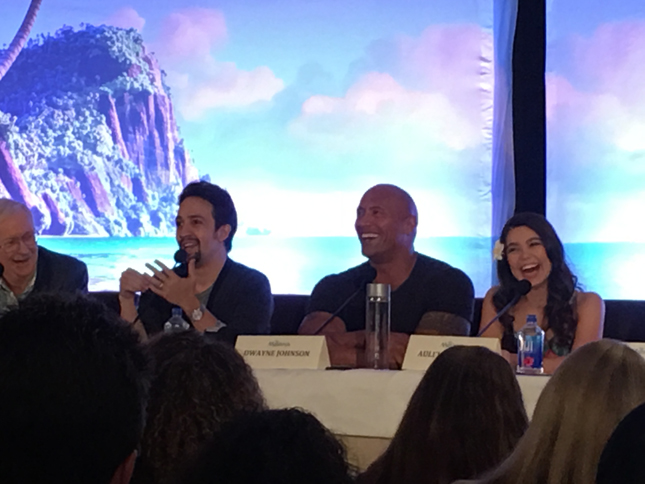
What was the feeling like seeing everything come together and have the audience see it?
LIN-MANUEL MIRANDA: Yeah, I saw a close to finished version of the film the day after I hosted Saturday Night Live, with 300 of my closest friends, because we were moving to London and so it was a screenings/goodbye party. It was so overwhelming. I mean, I made my wife cry. Which you know, she didn’t cry at the end of It’s a Wonderful Life. So we got her, I was like, we’re going to be okay.
DWAYNE JOHNSON: Yeah, in life we get an opportunity to do some cool things, we hope, you know and things that are fun and that we like doing. But with something like this, as Lin had said, he was so moved. I was so moved when I saw the movie, for a variety of reasons, not only you work on it, you pour your heart and soul into it. Tt’s culture. The grandmother in the movie, Gramma Tala is like my grandmother. Like so many of our grandmothers. And I think that when I saw it in a theater, in a very little theater with a group of people, what I noticed and I’ve used this term earlier, is that they were floating when they walked out of the theater. It was such a cool thing to be a part of and to watch them come out, energetically they’re floating. Also, too, I, in my entire career, I’ve never cried consistently through a movie. Ever! And anyway, it was a very, very special thing. So yeah, I guess probably the biggest thing for me was just to watch everybody walk out floating. That was cool.
AULI’I CRAVALHO: I also got to watch the film for the first time at the screening and that was incredible for me. I’ve been voicing this character for just about a year, a little bit over a year now and I’ve known how incredible she was. But that was me in a booth and to see her on screen, I mean, she kind of has some characteristics of me in her face. She’s a little bit like me, to have my voice in there, it’s a little uncanny, I’ll say that. But also to hear, I think, how the characters play off of each other; that was really incredible for me and especially Gramma Tala, that was, it was difficult for me to record. It was a challenge for me to record because I like being happy and having to challenge myself and go into that deeper place was challenging but so rewarding. I didn’t get to really connect to my grandmother before she passed, unfortunately, but I have the best mom in the world. Whenever I thought of someone who pushed me a hundred percent and loved me unconditionally and still does and still will for the rest of my life, that, that’s my mom.
OPETAIA FOA’I: Well, my job in this movie basically is looking after the cultural side of the movie. I’d like to thank John, Ron and Osnat for gambling on putting, including me, in this movie and it’s just been an amazing… amazing. I’ve been in heaven for three years. And then having Auli’i, I love your voice in this, it’s just incredible. She is the Moana voice that I always wanted and then having Dwayne in there… It just sealed the whole thing. So from a cultural side of things, I’ll give it a big tick, it’s good. And then having Lin, yes, I knew Lin before he became famous. So you know, we’re on that level. So, yeah, it’s just been a joy working with him. He’s all right.
OSNAT SHURER: Well for me, I’ve had the great, good fortune of seeing the film with audiences; and particularly what moved me the most was the chance to watch the film with people from the Pacific Island communities. We did screenings here and was fortunate enough to go to Tahiti and show it there. In Fiji, in the village that inspired us to make the ocean a character and seeing the responses to the film has been so moving. It’s so important to us to capture the spirit the Moana. Literally, after our big screening with Pacific Island Community – does anybody have any questions? Put up your hands. Just want to talk about the Moana in the room and I just lost it. That’s been very, very moving.
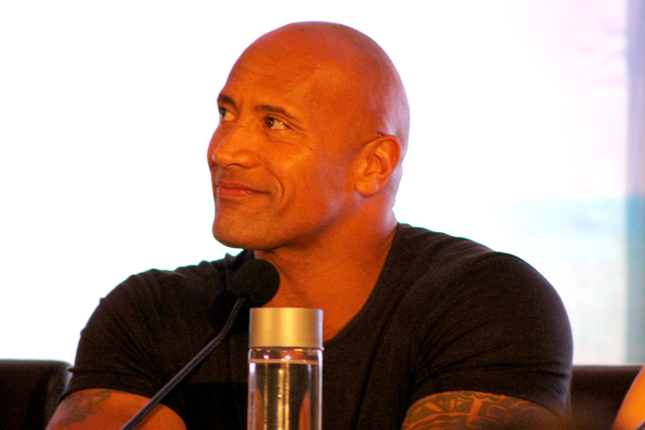
A few other sound bites from the Q&A:
• There was a dance competition at a music festival in Auckland, New Zealand that Lin-Manuel won when he jumped on stage and danced. Mentioning, “Luckily Puerto Ricans can shake their hips, too.”
• Ron Clements said that this was their first CG film and compared to hand drawn animation, things develop much slower.
• Auli’i Cravalho’s real mom has a line in the movie. She plays the woman with the coconut, who comes up to them with a problem on the island, but later says, “She’s doing great.”
• Lin-Manuel received the job the same day he found out he was going to be a father.
• There is a scene that is a reference to Mad Max: Fury Road.
• Some of the cast of Hamilton sang some some of the demos for Moana like, Phillipa Soo and Chris Jackson.
• Chris Jackson is the singing voice for Chief Tui.
• Lin-Manuel had been working on the film for over two and a half years, while working on Hamilton.
• You can hear Opetaia’s daughter, Olivia, chanting over the opening of the movie when iconic Disney logo appears.
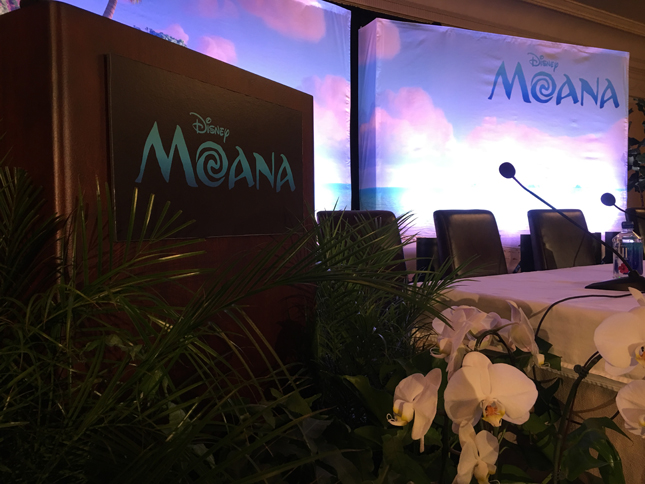
Moana is rated PG and hits theaters, Wednesday, November 23rd.


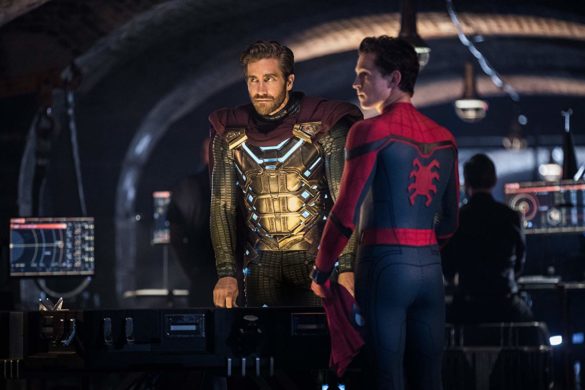
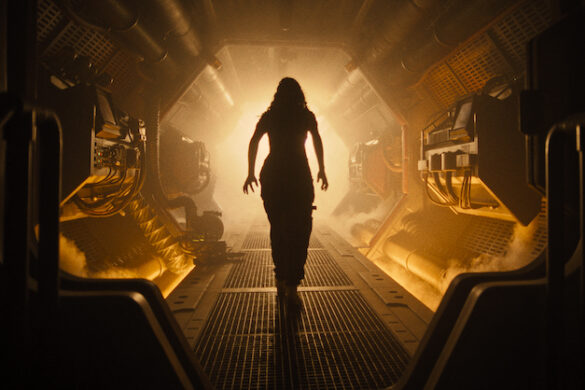
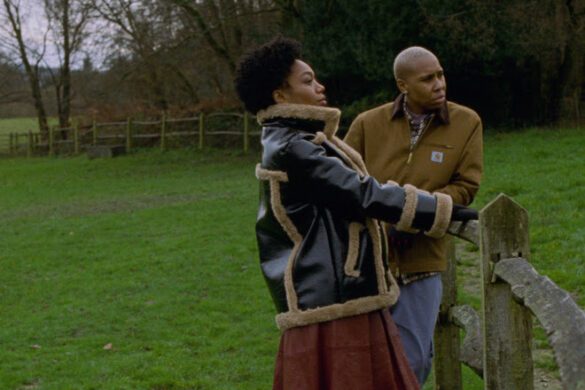
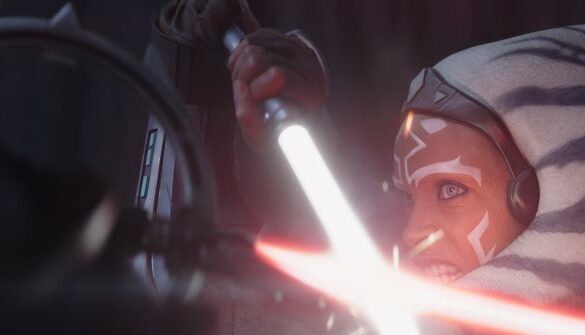

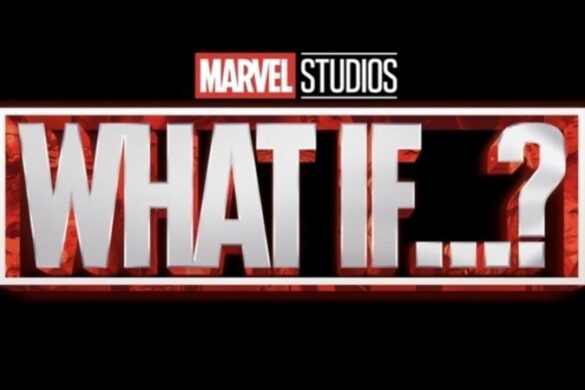
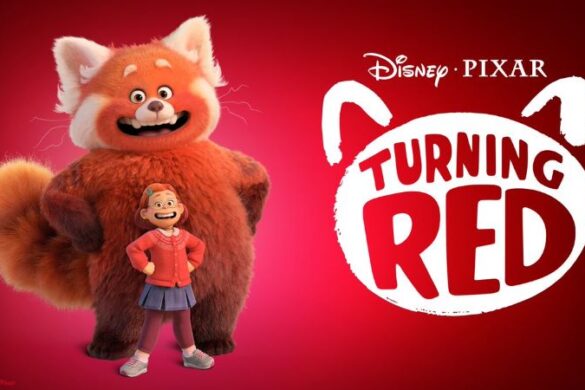
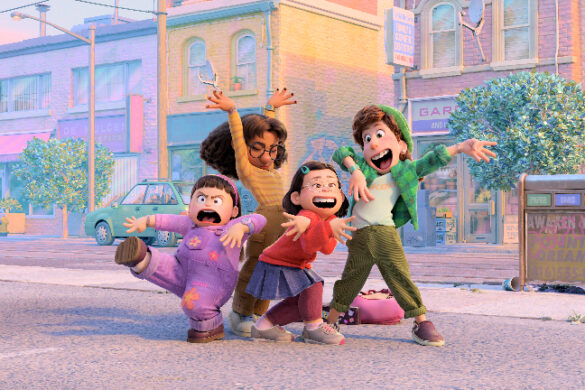
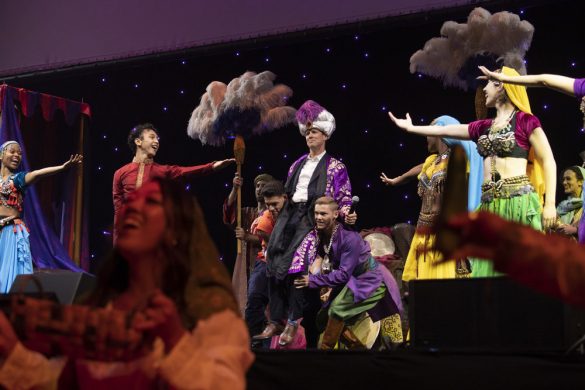
1 comment
Very nice Thanks!!!
Mark recently posted…Apostila de violão para iniciantes pdf Download Grátis